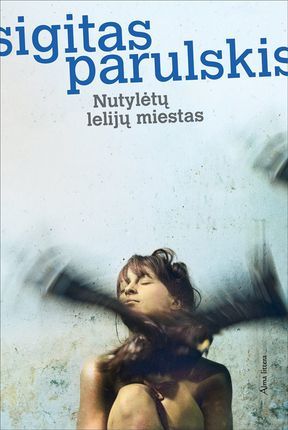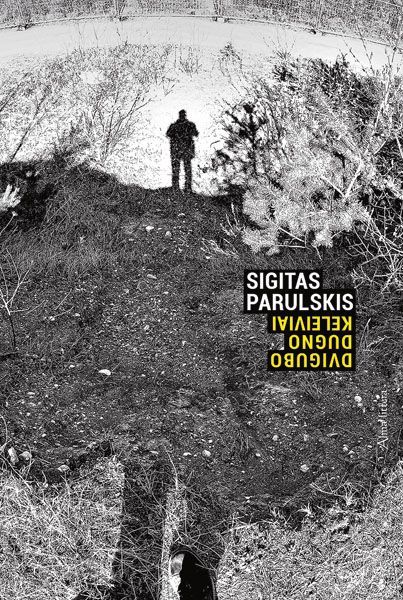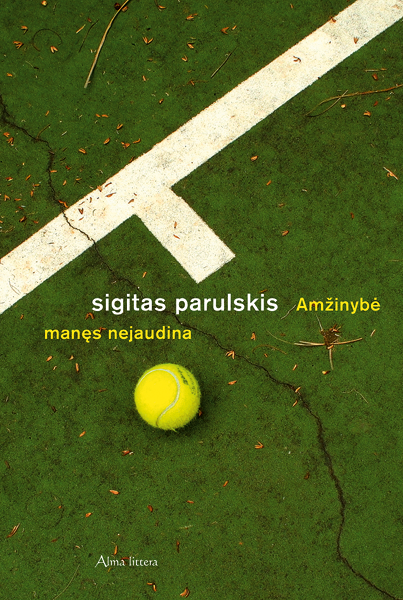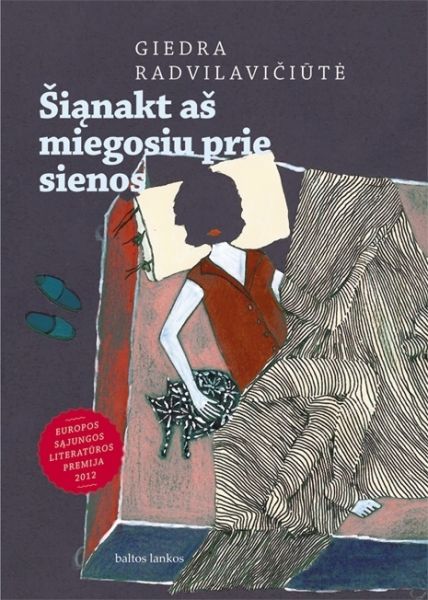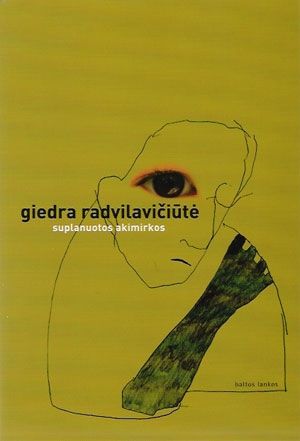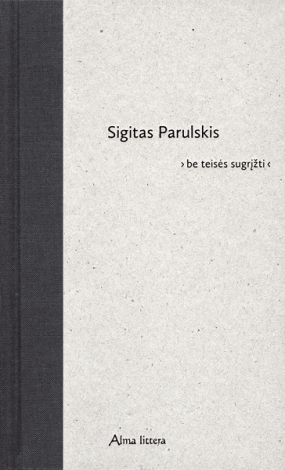 With no right to return
With no right to return
I Offer to Shoot the Plot Sigitas Geda, Alfonsas Andriuškevičius, Sigitas Parulskis, Giedra Radvilavičiūtė, Gintaras Beresnevičius
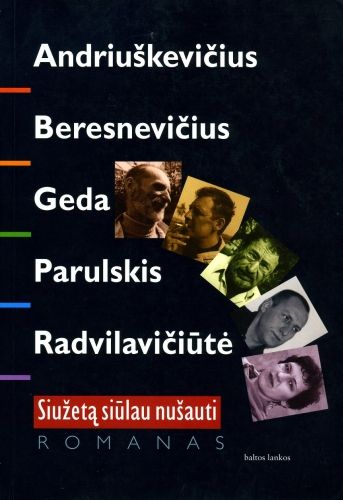
Published: 2005
ISBN: 9955-23-025-8
Number of pages: 173
Dimensions: 145 mm x 210 mm
Cover: Hardback
Publisher: UAB Baltų lankų leidyba
The collection of essays of five authors I Offer to Shoot the Plot has an intriguing explanation why it pretends to be called a novel. Can five authors, without making any mutual arrangements in advance, to write a collective novel? In the opinion of Sigitas Geda, a Lithuanian poet and the compiler of this book, they can do this as each author in his text discusses the problems important for Lithuanian society. One can say that "a hum" of Lithuanian contemporary life is heard throughout the book, despite that the narration is performed without a common scheme of the subject and without personages characteristic of a novel.
Sigitas Geda
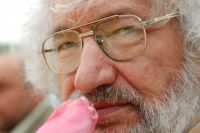
Sigitas Geda (1943-2008) was one of the most prolific Lithuanian poets, and he still remains an important literary idol. He debuted in 1966, and published over 50 collections of poetry for children and adults, librettos, screenplays, and a few books of diaries and essays. In spite of being a regularly published poet, he often found himself in trouble for antagonising the Soviet regime, even to the point of losing his job. He was an active participant in the Sąjūdis movement that led to independence, holding the position of secretary of the Lithuanian Writers’ Union at the time. He received all the main state awards for his work and political involvement, including the Order of Gediminas and the National Prize. His poetry is very life-affirming, it often concerns nature and the harmonious life of people in it. He was also a very prolific translator, never shunning difficult work, including translating the Quran. His own poetry has been translated into English, German, Norwegian and Polish.
Freskos (2012)
The last, posthumously published, book of Sigitas Geda’s poetry came as a surprise, even shock. It is a collection of erotic poetry. And not only does it contain mild sensual elements; each poem deals exclusively with the sexual act. The styles and genres are very different, as are the influences, from crudely humorous folk songs to sophisticated European poetry. The poems contain very strong language that no one would use in respectable company, and sometimes they balance on the edge of parody or satire. However, critics observe that it is not just an empty play of obscenities: it really is a literary work, a study of expression. To what point is it possible to write explicitly, so that it still remains poetry, and not pornography? Some say that it goes even deeper, both testing the limits of Lithuanian erotic language, and extending the boundaries of how sexuality is perceived in Lithuanian culture, ridding it of shyness and guilt, and boldly singing its joys and pleasures.
Alfonsas Andriuškevičius
Alfonsas Andriuškevičius – poet, essayist, art critic.
Was born on 18 December, 1940 in Vilkaviškis.
In 1959 he graduated from Kaunas Secondary School. In 1965 he graduated from Vilnius University and in 1973 he earned a degree at Historical Institute. From 1974 till 1990 he worked at Philosophy, Sociology and Law Institute, from 1990 till 2009 he was a lecturer at Vilnius Academy of Fine Arts and the head of Art History and Theory Department from 1993 till 2001. He is Doctor of Arts, a professor of honor of Vilnius Academy of Fine Arts.
A member of Lithuanian Writers' Union since 2001.
B i b l i o g r a p h y :
Grožis ir menas lietuvių estetikoje 1918–1940: monography. – Vilnius: Mintis, 1989.
33 eilėraščiai: poetry. – Vilnius: Lietuvos rašytojų sąjungos leidykla, 1994.
Lietuvių dailė 1975–1995: collection of critics. – Vilnius: Vilniaus dailės akademijos leidykla, 1997.
66 eilėraščiai: poetry. – Vilnius: Lietuvos rašytojų sąjungos leidykla, 1998.
Eilėraščiai: poetry. – Vilnius: Baltos lankos, 2000.
Rašymas dūmais: essays. – Vilnius: Apostrofa, 2004.
(Prieš)paskutiniai eilėraščiai: poetry. – Vilnius: Apostrofa, 2005.
Lietuvių dailė 1996–2005: collection of critics. – Vilnius: Vilniaus dailės akademijos leidykla, 2006.
Vėlyvieji tekstai: poems, essays, translations of Eastern poetry. – Vilnius: Apostrofa, 2010.
Pro A. A. Prizmę: Alfonsas Andriuškevičius talks to Jolanta Marcišauskytė-Jurašienė. – Vilnius: Modernaus meno centras, 2013.
C o - a u t h o r :
100 šiuolaikinių Lietuvos dailininkų. – Vilnius: R. Paknio leidykla, 2000.
Lietuvos dailės istorija: vadovėlis aukštųjų mokyklų studentams. – Vilnius: Vilniaus dailės akademijos leidykla, 2002.
Siužetą siūlau nušauti: romanas (together with G. Beresnevičius, S. Geda, S. Parulskis, G. Radvilavičiūtė). – Vilnius: Baltos lankos, 2002.
Pažymėtos teritorijos: collection of articles. – Vilnius: Tyto alba, 2005.
Café Tabac: litauiska essäer (together with J. Baranova, G. Radvilavičiūtė, R. Rastauskas). – Stockholm: Tranan, 2006.
D r e w u p :
Valentinas Antanavičius: catallogue of exhibition (together with V. Antanavičius). – Vilnius: Vilniaus šiuolaikinio meno centras, 1996.
72 lietuvių dailininkai – apie dailę: words of painters. – Vilnius: Vilniaus dailės akademijos leidykla, 1998.
T r a n s l a t i o n s f r o m E n g l i s h :
10 anglakalbių poetų: poetry. – Vilnius: Baltos lankos, 2008.
A w a r d s :
2006 Prize of Kaunas Radio and Television for the book “(Prieš)paskutiniai eilėraščiai” during Poetry Spring festival.
2007 National Culture and Art Prize Laureate of the 2007.
2010 The book “Vėlyvieji tekstai” was included into the list of twelve most creative books of the year.
2011 Yotvingian Prize for the book “Vėlyvieji tekstai”.
2011 The book “Vėlyvieji tekstai” was nominated in the Book of the Year Campaign in the prose section.
Sigitas Parulskis

Sigitas Parulskis (born in 1965), a Lithuanian poet, playwright, novelist, and literary critic, is one of Lithuania’s most fêted and influential contemporary writers. A graduate of Vilnius University in Lithuanian language and literature, Parulskis has published articles in many of the country’s most prominent newspapers and journals. He is a translator of Russian, American, and British literature and has worked as a lecturer in Creative Writing at Vilnius University, and is currently a lecturer at the Vilnius Academy of Arts. His first book of poetry, Iš ilgesio visa tai (All That Out of Longing), was published in 1990, and was soon followed by several books of poetry and essays, a collection of short stories, and five novels. He is also the author of several plays and theatre scripts. Works by Parulskis have won all the major Lithuanian literary awards. In 2002 the novel Trys sekundės dangaus (Three Seconds of Heaven) was recognized as best book of the year and garnered Parulskis the Lithuanian Writers’ Union Prize. In 2004, Parulskis received the National Prize in literature and the Lithuanian National Art and Culture Award. He received the Person of Tolerance Award for 2012 for his most recent novel, Tamsa ir partneriai (Darkness & Company), which tells the gripping story of a young Lithuanian man drawn into the events of the Holocaust in Lithuania. Parulskis is singular among Lithuanian writers for the ironic, incisive, critical, and sometimes provocative style in which he explores the traumas experienced by Lithuanians of his generation, who grew up under Soviet rule and came of age during the country’s transition to independence. The most beautiful moments in his writing explore the loneliness of being human and the brutal, primordial nature of reality with unsurpassed sensitivity and depth, and a soft irony unique to this author. Works by Parulskis have been translated into Russian, English, Latvian, Finnish, Polish, Czech, French, German, Greek, Swedish, and Italian among others.
Trys sekundės dangaus (Three seconds of heaven, 2002) The framework of the novel’s plot is constructed from the narrator’s memories of Soviet life. In post-1991 Lithuania the protagonist receives a Western sovietologist’s offer to recount his experience as a paratrooper in a unit in the Soviet military that was stationed in the former German Democratic Republic. When the idea fails (it is impossible to mechanically reproduce one’s experience), he takes another attempt at recording his story with a tape recorder, but this time alone in a small health-resort town near the sea. There the protagonist consumes a large amount of alcohol and ends up at a centre to become sober. There, in his bed and hung over, episodes from his past life appear – as a Soviet army paratrooper, his study years, his love for Maria, and episodes from the stories of his unplanned encounters with other women. In addition to the authentic, brutally obscene experience, which takes on an existential dimension, the novel is compelling in its language and style. The book contains slang and swear words, physiological, bodily sensations, but in the text all these elements fuse into what could a kind of “existential linguistics“. Critics have pointed out the writer’s rare ability to employ several language codes, to weave together the layers of the sacred and off-colour everyday talk.
Murmanti siena (The Murmuring Wall, 2008) The novel tells the story of four generations of Lithuanians, and effectively becomes the story of 20th-century Lithuania. The characters get involved with the communists, the Nazis, the Holocaust, the freedom fighters, and independence. They are also involved in their own lives: love, relationships, family, the past, the town, the city, the Church… The ‘murmuring wall’ of the title is both a real wall standing on the family’s homestead, and also a central metaphor for 20th-century history. It is all about either isolating the frightening evils that hide behind it, or fencing yourself off for safety and support.
Tamsa ir partneriai (Darkness & Company, 2012) Through the very contemporary metaphor of photography, leading Lithuanian author Sigitas Parulskis confronts the darkest chapter in Lithuania’s history and tries to understand “what happened to our peaceful nation” during the Nazi occupation that led to the murder of 94 per cent of its Jewish population. Accompanying a squad of local executioners to the villages and forests that were the main sites of the Holocaust in Lithuania, Vincentas descends into a paralyzing moral abyss – he is a powerless witness to both the horror of the events and the banal humanity of the killers. But his camera cannot protect him, and as Judita has warned, “the war will rip the masks from all of our faces.” When she learns of his secret, Judita rejects him and goes in search of her husband, a musician, in the Kaunas ghetto. In a surreal and harrowing climatic scene, the two lovers are reunited with the SS officer, who has orchestrated a sadistic erotic game that will seal each of their fates. Weaving together historical detail, heart-breaking poetic description, sensuality, Biblical references, and elements of magical realism in a thrilling plot, Darkness and Company is ground-breaking: it is the first major novel by an ethnic Lithuanian to examine the Holocaust in that country. It is also a powerful work of fiction that speaks directly to readers of all nationalities.
Reminiscent of the aesthetics of shocking beauty juxtaposed with horrific ugliness in such cinematographic masterpieces as Liliana Cavani’s The Night Porter and Lina Wertmüller’s Seven Beauties, Parulskis’ Darkness and Company is a tour de force, a blow to the reader in its handling of the tragic history of his nation – and a sigh of relief. The Holocaust is not sinking into oblivion in Lithuania. Instead, it is powerfully reinterpreted by a young writer whose experience would naturally lead him back to the 1980s, rather than to the Second World War. – prof. Leonidas Donskis
Mano tikėjimo iltys (The Fangs of My Convictions, 2013) is a multi-layered and multi-genre book. With documentary-like detail, this often existential and ironic Parulskis essay describes the recollections of a Soviet, i.e. a twentieth-century, man, and additionally includes I am Love, a theatrical monologue. The writer himself suggests to the reader that these words come from observation, experience, and imagination. Within them, behind the dense (self-conscious) irony and veil of light sarcasm lies solid life experience and emotion, a variety of manifestations of being, reflections, realities, and recollections. The better part of the texts display Parulskis’ usual clear and evident thinking and writing style, next to which appears a new, and almost cynical fatigue of the narrator, that doesn’t stand-out, but reveals itself slowly – after all, convictions have fangs, but hold no promises.
B i b l i o g r a p h y :
Iš ilgesio visa tai: poems. – Vilnius: Vaga, 1990.
Mirusiųjų: poems. – Vilnius: Baltos lankos, 1994.
Mortui sepulti sint: poems. – Vilnius: Baltos lankos, 1998.
S. Parulskis. 50 poems (selected by A. Marčėnas); A. Marčėnas. 50 poems (selected by S. Parulskis). – Vilnius: Baltos lankos, 1999.
Dangaus durys dažytos: album of poems: audio. – Vilnius: Tembras, 1999.
Nuogi drabužiai: collection of essays. – Vilnius: Baltos lankos, 2002; Alma littera, 2015.
Trys sekundės dangaus: novel. – Vilnius: Baltos lankos, 2002, 2004, 2008, 2015.
Marmurinis šuo: poems. – Vilnius: Baltos lankos, 2004.
Doriforė: novel. – Vilnius: Baltos lankos, 2004.
Miegas ir kitos moterys: collection of essays. – Vilnius: Baltos lankos, 2005, 2006.
Sraigė su beisbolo lazda: short stories. – Vilnius: Baltos lankos, 2006, 2010, 2015.
Trys pjesės. – Vilnius: Baltos lankos, 2006.
Murmanti siena: novel. – Vilnius: Baltos lankos, 2008, 2009.
Šiaurinė kronika: essays. – Vilnius: Lietuvos nacionalinė Martyno Mažvydo biblioteka, 2008.
Pagyvenusio vyro pagundos: poetry. – Vilnius: Baltos lankos, 2009.
Vėjas mano akys: novel. – Vilnius: Baltos lankos, 2010.
Prieš mirtį norisi švelnaus: book of short texts. – Vilnius: Alma littera, 2011–2013.
Tamsa ir partneriai: novel. – Vilnius: Alma littera, 2012, 2013.
Mano tikėjimo iltys: texts that appeared from observations, experience and imagination. – Vilnius: Alma littera, 2013.
Be teisės sugrįžti: collection of poems. – Vilnius: Alma littera, 2015.
P l a y s :
Iš gyvenimo vėlių: play. – staged at Šiauliai Drama Theater, 1995.
P. S. Byla O. K.: play. – staged at Lithuanian National Drama Theater, 1997.
Nenoriu susipažinti: radio play. – staged at Lithuanian National Radio, 1998.
Meistras ir Margarita: script. – staged at Oskaras Koršunovas Theater, 2000.
Nenoriu susipažinti: radio play. – staged at Lithuanian National Radio, 1998.
Barboros Radvilaitės testamentas: script. – staged at National Youth Theater, 2002.
Viskas, ko pageidavote: radio play. – staged at Lithuanian National Radio, 2004.
Keltininkas: play. – staged at Oskaras Koršunovas Theater, 2008.
T r a n s l a t i o n s f r o m R u s s i a n :
D. Charmsas. Nutikimai. – Vilnius: Vyturys, 1998; Tyto alba, 2007, 2013.
M. Norbekovas. Kvailio patirtis, arba Kelias į praregėjimą: how to get rid of glasses. – Vilnius: Alma littera, 2004, 2009–2012, 2014.
A. Čekalova, M. Poliakovskaja. Bizantija. – Vilnius: Alma littera, 2003.
M. Gasparovas. Su skydu ir už skydo: tales of ancient Greece culture. – Vilnius: Alma littera, 2004.
A. Turgenev. Arkašono mėnuo: novel. – Vilnius: Alma littera, 2005.
B. Akuninas. Azazelis: novel. – Vilnius: Baltrus, 2006; Sofoklis, 2013.
A. Čechov. Vyšnių sodas; Trys seserys; Dėdė Vania; Žuvėdra: plays (together with M. Miškinis, B. Sruoga, J. Talmantas). – Vilnius: Alma littera, 2006.
M. Norbekovas. Energinė klizma, arba Tetos Niuros iš Skylėnų triumfas. – Vilnius: Alma littera, 2010.
M. Šiškin. Laiškų knyga: novel. – Vilnius: Vaga, 2011, 2015.
B. Akunin. Achilo mirtis: novel. – Vilnius: Metodika, 2012.
B. Akunin. Šnipų romanas: novel. – Vilnius: Sofoklis, 2013.
M. Stepnova. Lazario moterys: novel. – Vilnius: Tyto alba, 2013, 2015.
T r a n s l a t i o n s f r o m E n g l i s h :
A. Toigo. Pelės maldos. – Vilnius: Alma littera, 2004.
S. Shepard. Mielos mažos melagės: novel. – Vilnius: Alma littera, 2011.
S. Shepard. Merginos be ydų: novel. – Vilnius: Alma littera, 2011.
S. Shepard. Viskas tobula: novel. – Vilnius: Alma littera, 2012.
S. Perkins. Ana ir prancūziškas bučinys: novel. – Vilnius: Alma littera, 2014.
S. Perkins. Lola ir vaikinas iš gretimo namo: novel. – Vilnius: Alma littera, 2014.
L. Lowry. Suskaičiuotos žvaigždės: novel. – Vilnius: Alma littera, 2015.
B o o k s i n f o r e i g n l a n g u a g e s :
Sigitas Parulskis: poems (in English, translated by L. Sruoginis). – Klaipėda: Klaipėda House of Artists, 2002.
Dulkėmis ir pelenais: collection of poems and essays (in Greek). – Rodas: Pezografia, 2003.
Tris sekundes debesu (in Latvian). – Riga: AGB, 2004.
Selenes Loch: Stück in einem Akt (in German, Übersetzt aus dem Litauischen von J. Pieslyte). – Paris: Union des Théâtres de l'Europe, 2004.
The Towers Turn Red (in English). – Airija: Southword editions, 2005.
Tre sekunder himmel (in Swedish). – Lund: Ariel, 2005.
En hund av marmor: dikter (in Swedish). – Lund: Ariel, 2005.
Tre secondi di cielo (in Italian). – Milano: ISBN Edizioni, 2005.
Trzy sekundy nieba (in Polish, przełożyła I. Korybut-Daszkiewicz). – Warszawa: Czytelnik, 2008.
Tre sekonda qiell: roman (in Albanian, pёrktheu nё shqip D. Taçe). – Shkup: Shkupi, 2008.
Tri sekunde neba (in Slovenian, prevod in spremna beseda K. Pisk). – Ljubljana: Modrijan, 2008.
Drei Sekunden Himmel: Roman (in German). – Berlin: Claassen, 2009.
D r e w u p :
Šiuolaikinės lietuvių poezijos chrestomatija. – Vilnius: Alma littera, 2002, 2004.
C o - a u t h o r :
Siužetą siūlau nušauti: novel (together with A. Andriuškevičius, G. Beresnevičius, S. Geda, G. Radvilavičiūtė). – Vilnius: Baltos lankos, 2002.
A w a r d s :
1991 Zigmas Gėlė-Gaidamavičius award for the best poetry debut of the year.
1995 Yotvingian Prize for poetry book “Mirusiųjų”.
1996 “Kristoforas” prize for the best theater debut.
2002 Book “Trys sekundės dangaus” was included into the list of twelve most creative books of the year.
2004 National Culture and Art Prize.
2004 Award of Lithuanian Writers’ Union for the book “Trys sekundės dangaus”.
2004 Book “Doriforė” was included into the list of twelve most creative books of the year.
2005 Book “Miegas ir kitos moterys” was nominated in the Book of the Year Campaign, in Prose section and included into the list of twelve most creative books of the year.
2007 Book “Sraigė su beisbolo lazda” was elected as the Book of the Year.
2008 Book “Murmanti siena” was included into the list of twelve most creative books of the year.
2009 Book “Murmanti siena” was nominated in the Book of the Year Campaign, in Prose section.
2009 Book “Pagyvenusio vyro pagundos” was included into the list of twelve most creative books of the year.
2011Book “Prieš mirtį norisi švelnaus” was nominated in the Book of the Year Campaign, in Prose section.
2011 Translation of M. Šiškin novel “Laiškų knyga” was included into the list of the best translated modern literature of the year.
2013 Book “Tamsa ir partneriai was nominated in the Book of the Year Campaign, in Prose section.
2013 Book “Mano tikėjimo iltys” was included into the list of twelve most creative books of the year.
2013 Translated M. Stepnova novel “Lazario moterys” was included into the list of the best translated modern literature of the year.
Other books by Sigitas Parulskis
Giedra Radvilavičiūtė
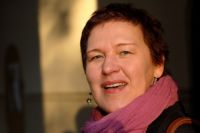
Giedra Radvilavičiūtė (1960) could probably be called the most fashionable Lithuanian writer. This is strange, because she is one of the staunchest critics of the proliferation of poor-quality literature, and an outspoken advocate of a higher quality of reading. After teaching literature in a school and briefly doing research work in the USA, her writing career began in the late 1990s, when she started publishing essays in the cultural press. We might say that she is the mother of the modern Lithuanian essay, which is now the most popular genre of prose; but few can compare with her in terms of controlled style and structure. Her essays deal with everyday experiences, which are transformed as if by magic into wonderful spectacles. She often discusses the situation of woman, and questions various cultural and social stereotypes of the woman. A self-confessed admirer of Vladimir Nabokov, she is quite frank and personal in her literary work.
Šiąnakt aš miegosiu prie sienos (2010)
Radvilavičiūtė’s second collection of essays, shortlisted for the Book of the Year award in 2011, and a winner of the European Union Prize for Literature in 2012, in some ways continues the themes and moods of the first collection. The main character, if essays can be said to have characters at all, is a single and lonely woman of a certain age. However, the first book dealt with the relationships between men and women much more directly. This one is more circumspect, and the emphasis is on loneliness rather than on relationships. Loneliness is dreaded, desired, and impossible to achieve. The central theme is complimented by a broad variety of other themes, easily discernible references to mundane, everyday life, from brand names to Hollywood stars. It reveals her personal attitude towards society and its problems. Some critics note that these themes make the book easy to read for a very wide audience, hence its popularity. But it is not ‘popular’ literature. As writing, it is both complicated and skillfully controlled. The doyenne of the essay keeps getting better at it.
Other books by Giedra Radvilavičiūtė
Gintaras Beresnevičius

Gintaras Beresnevičius (1961-2006) was one of the few genuine scholars of old Baltic religion and mythology. Most of his work is academic research in the field, often pioneering and well regarded by his peers. He taught religious studies and Lithuanian mythology at various universities, and was a much-loved teacher. However, his work was not limited to narrow academic research and discussion. He became known very early on as a popular writer of non-fiction, mostly related to the national identity, its roots and the political situation. These analyses were always based on his research. He is still remembered as an essayist and a short-story writer. Unfortunately, he began writing literature rather late in his life, which was then cut short by his untimely death. But what he wrote was groundbreaking. His literary works are both humorous and intellectually complex, almost encyclopaedic. His insights into people and the society are chillingly deep. His work have been translated into several languages, such as Latvian, Croatian, Russian and English.
Paruzija (2005)
Beresnevičius’ first full-length novel is both comical and frightening. It is essentially an apocalyptic tale about the end of the world, brought about by gods made by man. Several plotlines intermingle, all laced with mythological details and a glorious pastiche of various cultures. As the story progresses, the more fantastic and surreal, even phantasmagoric, it all becomes. It is difficult to say whether it is more horrific or satirical. At the same time, it is a poignant reflection of contemporary Lithuanian society, its gods and godlessness, its frail beliefs and its false idols. Many critics have lauded the book as ‘the first postmodern Lithuanian novel’ (although such titles are obviously always debatable). Some have found it too difficult and complicated, because of the amount of obscure references that have the reader reaching for an encyclopaedia. However, it can be said without doubt that this is one of the best-quality pieces of Lithuanian literature, and a book that can proudly be presented as an introduction to the Lithuanian psyche for readers abroad.
Publisher
A. Jakšto g. 5, LT–01105 Vilnius
Tel.: +370 5 2407906
Email: leidykla@baltoslankos.lt
Publishing house “Baltos lankos” was established in 1992 with intention to publish high quality literature. The range of our publications is very wide: new books by Lithuanian authors, translations of elitist foreign literature as well as most popular works of fiction, crime fiction, monographs, children book, academic writings are constantly being brought out. “Baltos lankos” continuously search for new possibilities to publish new titles, collaborate with translators, national and international authors.
